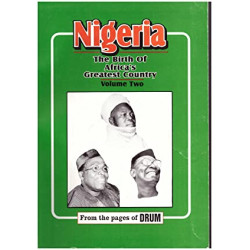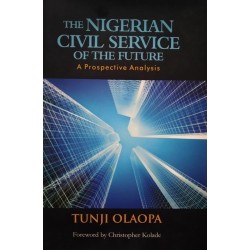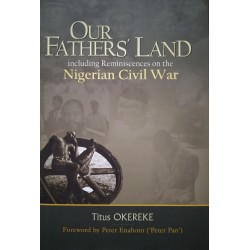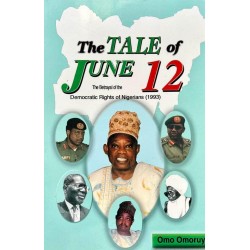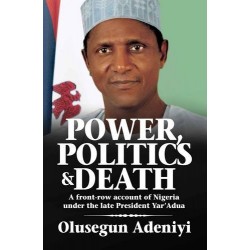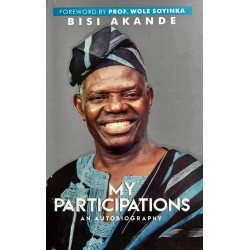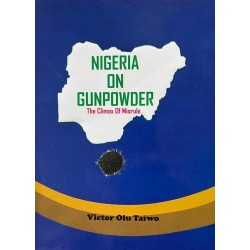No products
Prices are tax excluded
Top sellers
-

-

Nigeria:The Birth of Africa’s Greatest Country Vol 1&2
Nigeria:The Birth of Africa’s Greatest Country chronicles the social...
₦ 16,000 -

-

A Swamp Full of Dollars
Michael Peel, a correspondent for the financial times has told the...
₦ 4,500 -

IRONSI: Nigeria, the Army, Power, and Politics
Ironsi was Nigeria’s first military Head of State. He was killed in...
₦ 10,000 -

Nigerians In Theory
In a humorous way, Nigerians In Theory tries to depict the full richness...
₦ 8,000 -

-

This House of Oduduwa Must Not Fall
This House of Oduduwa Must Not Fall represents a quest to share the...
₦ 8,500 -

Federalism and Political Restructuring in Nigeria
The book contains essays written by four generations of Nigerian...
₦ 5,000 -

The Tragedy of Victory
The Tragedy of Victory: On-the-Spot Account of the Nigeria-Biafra War in...
₦ 10,000
Categories
New products
-

A History of Tuareg Migration from Niger Republic To Sokoto: 1900-1985
The migration of races, tribes and ethnic groups across West Africa is a...
₦ 9,000 -

-

-

The Nigerian Century
The Nigerian Century captures the essence of Nigeria, it's people and...
₦ 14,000 -

Decolonizing Nigeria, 1945-1960, Politics, Power, and Personalities
Bearing both the professional and general readers in mind, Decolonizing...
₦ 18,600 -

How Democracies Die: What History Reveals About Our Future
Democracies can die with a coup d'état - or they can die slowly. This...
₦ 17,600 -

The Yoruba nation and politics since the nineteenth century : essays in honor of Professor J. A. Atanda
The book covers a wide range of topics discussing the Yoruba people of...
₦ 22,500 -

The Coming Wave: Technology, Power, and the 21st Century’s Greatest Dilemma
Cofounder of the pioneering AI company DeepMind sounds the alarm on the...
₦ 17,200
Search "nigeria" 23 results have been found.
Federalism and Political Restructuring in...
The book contains essays written by four generations of Nigerian scholars. It is the first to examine the historical, political, economic and comparative dimensions of attempts by the military to restructure the Nigerian federation.
₦ 5,000In StockNigeria:The Birth of Africa’s Greatest...
Nigeria:The Birth of Africa’s Greatest Country chronicles the social political events of colonial and immediate post-colonial Nigeria as recorded by Drum, the popular monthly magazine of those times.
₦ 16,000In StockPolitics and Government in Nigeria
The book provides an in-depth analysis of the art of governance; shows the underlying theories, principles, institutions, mechanisms and processes that are involved in the management of the affairs of a state.
₦ 9,200In StockThe Federal Republic of Nigerian Army: The...
A former general in the Nigerian army, defence attache to Zimbabwe and member of the Abacha caucus, chronicles the role played by the army in Nigerian history, from the first military coup in 1966 to Obasanjo’s accession to power in 1998.
₦ 6,500Out of stockThe Nigeria Civil Service Of The Future
With over twenty years of committed service in the Nigerian Civil Service, Junji Olaopa Brings his experience as an expert insider to bear on this roadmap book in the journey towards achieving a world class Nigerian civil service of the future.
₦ 6,000In StockOur Fathers’ Land
Throughout this compelling narrative, Okereke emerges as a credible witness to history.
₦ 6,500In StockThe Tale of June 12: The Betrayal of the...
The annulment of “free, fair and credible” elections anywhere and at anytime has constituted, and still constitutes a gross betrayal of citizens’ right to human dignity. Developments in Algeria and Burma had illustrated this so well.
₦ 9,000In StockPower, Politics and Death: A Front-row...
What really happened during Yar'Adua's last illness?
₦ 8,500In StockMy Participations: An Autobiography
With this book, Akande has stirred the hornets' nest and revelations from My Participations would affect public debates and perceptions of Nigerian Leadership and politics for generations to come.
₦ 11,000In StockNigeria on gunpowder: The climax of misrule
This remarkable work, has been crafted as hormonotherapy for all Nigerians and an exposition for citizens of the world. It is a grand panoptic relay and candid analysis of the chronicle of events that have moulded Nigeria from primordial times to the present tragic moment.
₦ 10,000In StockTenants of the House
Tenants of the House is a skillful depiction of the ugly underbelly of Nigerian politics unveiling the intrigues, chicanery, and greed pervasive within the country's political and legislative processes.
₦ 5,000In StockNigeria: Descent Into Anarchy and Collapse?
Nigeria celebrated the hundredth year of the amalgamation of Northern and Southern Nigeria resulting in the country now known by that name. Within that period, Nigerians of all persuasions and across divides have repeatedly clamoured for the dismemberment of the country.
₦ 6,000In Stock



